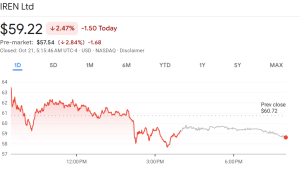Join our Telegram channel to stay up to date with the latest news
Canada’s British Columbia will stop accepting new applications to connect new crypto mining projects to its clean, renewable energy infrastructure.
October 20 statement, the province said there This will be a “permanent ban on new BC Hydro connections to the power grid” for crypto miners that will come into effect later this year.
This follows an 18-month ban that was rolled out in December 2022. This was done so that the government could take time to develop a permanent framework that balances the needs of crypto miners, residents and businesses in the region.
In the announcement, the British Columbia government also said the cryptocurrency mining sector’s “disproportionate energy consumption” provided “limited economic benefits.”
Indeed, the pending crypto projects would have required more than 11,700 gigawatt hours of electricity each year, which is enough to power hundreds of thousands of homes across British Columbia.
Crypto mining machines are known for their high power consumption.
2013 was an incredible year for Bitcoin mining thanks to the introduction of ASIC.
The hashrate increased from 22 TH/s to 10,000 TH/s.
An increase of 45,400% in just 12 months.
The equivalent jump today would see the hashrate increase from 1 ZH/s to 455 ZH/s (a little less than half a Yottahash). pic.twitter.com/7ioYaPKftR
–Tomas Greif (@TomasGreif) October 1, 2025
Energy supply to AI and data centers will be capped
In this announcement, the government recognized the potential economic gains that could come from AI and data centers.
He said that “data centers and AI can offer enormous potential in innovation, information technology and data sovereignty.” He adds that the adoption of AI will “continue to improve the productivity and competitiveness” of B.C. industries.
Although the government sees the potential economic benefits of AI and data centers, it believes that the “rapid expansion and high energy consumption” of these emerging sectors “will require balanced, forward-looking planning.”
In addition to high energy demand, projects in these sectors “generally generate fewer jobs and revenue for the province” than natural resource projects, the government said.
To manage the growth of the AI and data center sectors, the BC government announced it would issue a “competitive call for projects” in early 2026 for a period of two years.
During this period, BC Hydro will provide businesses in these sectors with 300 megawatts for AI and 100 megawatts for data centers.
IREN shares slip 2% following announcement of upcoming legislation
One of the crypto miners that the new legislation could impact is IREN, which has several locations in British Columbia. According to the company’s website, the company has three main locations, namely Mackenzie, Prince George and Canal Flats. Together, these sites consume 160 megawatts of energy in the region.
Recently, the company has also moved into AI and HPC. In September, the company announced that it had doubled its AI-cloud capacity to approximately 23,000 GPUS through the purchase of approximately 7,100 Nvidia B300s, 4,200 Nvidia B200s and approximately 1,100 AMD MI350Xs for its Prince George data center.
Following the announcement of the upcoming legislation, IREN shares fell more than 2%, according to Google Finance data.


IREN share price (Source: Google Finance)
Related articles:
Best Wallet – Diversify your crypto portfolio
- Easy-to-use, feature-driven crypto wallet
- Get Early Access to Upcoming Token ICOs
- Multi-chain, multi-wallet, non-custodial
- Now on App Store, Google Play
- Stake to win a $BEST native token
- More than 250,000 active users per month
Join our Telegram channel to stay up to date with the latest news




